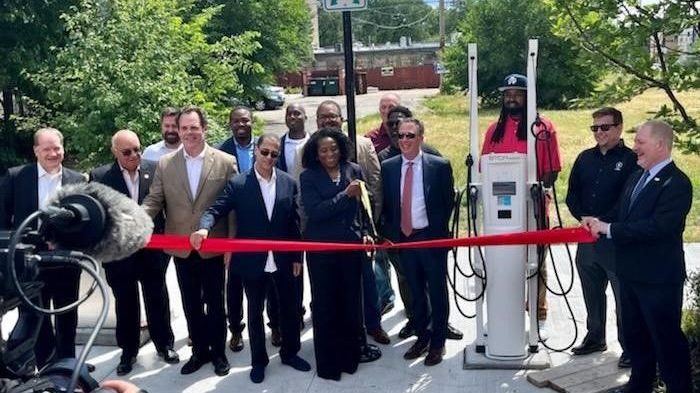Proposed plan would provide $100 million per year in incentives, education and infrastructure support to remove barriers to electrification and deliver significant environmental and air quality improvements for communities
CHICAGO, July 6, 2022 — ComEd announced that it has submitted its plan to support the adoption of beneficial electrification (BE) technologies, including customer adoption of electric vehicles (EVs) to the Illinois Commerce Commission (ICC), which regulates the state’s public utilities. ComEd is proposing to commit $100 million annually over the next three years to promote beneficial electrification, with programs designed to reduce upfront costs of EVs and charging equipment; enable broad, equitable deployment of charging infrastructure and other electrification technologies; educate customers; and prioritize investments equitably for communities in need.
This plan would significantly lower carbon emissions and provide invaluable health and human welfare benefits including air quality improvements derived from a reduction of harmful pollutants from vehicle tailpipes. The plan marks the latest milestone in the implementation of the Climate and Equitable Jobs Act (CEJA). ComEd’s plan advances the objectives of CEJA, including the law’s goal of having 1 million EVs on the road in Illinois by 2030 and reducing greenhouse gas emissions and improving air quality for communities across the state.
Through a mix of incentives, new rate design options, and educational and technical support, ComEd’s plan would help promote the transition to clean transportation and other clean technologies. The proposed investments would prioritize low-income customers and customers residing in environmental justice and Restore, Reinvest, Renew (R3) communities, as defined by the State of Illinois.
“ComEd is committed to supporting a clean energy future that promotes cleaner air and safer communities, and that helps all of our communities achieve the goals set forward by the state’s new clean energy law,” said Gil C. Quiniones, CEO of ComEd. “The threat of climate change requires us to take swift action to reduce emissions by moving faster to adopt cleaner technologies. Designed with input from a wide range of local stakeholders and experts, our plan will reduce barriers for customers and support broad adoption of electrification across homes, schools, and communities in our region – keeping the state at the forefront for clean energy while creating the infrastructure needed to eliminate harmful emissions across all our communities.”
ComEd made the announcement during a ribbon-cutting ceremony at a recently installed Multi-Unit Dwelling (MUD) EV charging station at 43rd Street and Calumet Avenue in Chicago’s Bronzeville neighborhood. This installation is the first of five planned MUD charging stations that will serve residential properties with three or more units and enable research funded in part by a U.S. Department of Energy grant. EV charging infrastructure, and especially infrastructure designed to provide accessibility to all communities, is vital for the broad adoption of EVs. The new BE Plan, combined with state and federal programs, will further expand deployment of EV infrastructure across northern Illinois.
“For too long, the health of our communities has been negatively impacted by harmful air pollution, but CEJA is giving us an opportunity to reverse that trend and accelerate the transition to EVs,” said Billy Davis, General Manager of Jitney EV and a member of the Bronzeville Community of the Future Advisory Council. “The Beneficial Electrification plan ComEd is proposing will give a much-needed boost to our efforts in Bronzeville and across the region to electrify transportation, eliminate charging deserts, improve air quality, and create economic opportunities for new businesses.”
In support of the state’s goals, the plan will contribute to long-term air quality improvements by enabling EV adoption to lower carbon and air pollutant emissions. ComEd estimates that vehicle and other incentives and rebates as outlined in the plan would help remove 900,000 metric tons of carbon emissions, the equivalent of the amount of carbon sequestered by approximately 1 million acres of U.S. forests in one year, an area approximately the size of Glacier National Park. What’s more, the plan would avoid an estimated 4,000 metric tons of local pollutants emitted from vehicle tailpipes, providing health and human welfare benefits, especially for disadvantaged communities where vehicle emissions have the greatest health impacts.
“CACC encourages the use of clean fuel vehicles, clean fuels, and advanced vehicle technologies to promote an improved environment, energy efficiencies, domestic and renewable fuels, and a reduction in the use of imported petroleum,” said John Walton, Chair of the Chicago Area Clean Cities (CACC) coalition. “Electric vehicles have a role in furthering our mission to improve air quality and reduce lung disease, and ComEd’s beneficial electrification plan will help expand access to infrastructure and encourage more robust EV participation for our region.”
“While Illinois has dramatically cut air pollution from fossil fuel power plants, vehicles are now the number one cause of carbon pollution in Illinois,” said Brian Urbaszewski, Director of Environmental Health Programs at Respiratory Health Association. “With a focus on getting more zero-emission electric vehicles in communities, ComEd’s Beneficial Electrification plan is a serious roadmap for improving air quality precisely where the combination of high lung disease rates and unhealthy air pollution levels present the greatest threat to area residents.”
Earlier this year, ComEd participated in a series of workshops to engage regional partners, including 10 meetings hosted by the ICC, to formalize input from those representing communities, health advocacy, industry, local business, school districts and other customer groups and interests across the service region. ComEd embraced the feedback it heard and proposed a plan to address the priorities of the communities it serves.
The key components of the BE Plan include:
Residential Program
The BE Plan includes $15 million annually in incentives that will reduce upfront costs related to purchase and installation of EVs, in-home charging stations, and non-transportation electrification equipment (such as building heating and cooling, lawn equipment, electric stoves, etc.). Larger rebates will be available for low-income customers and those located in environmental justice and/or equity investment eligible communities. To ensure those with the greatest needs have access to resources, ComEd will target 50 percent of its residential program funds for customers in equity investment eligible communities.
C&I and Public Sector Program
To reduce the cost barriers associated with purchasing fleet vehicles and installing charging stations, the plan proposes $63 million annually to support new rebates for fleet electrification, with the majority of funding going toward vehicle rebates for public transit, commercial and school fleets. Funding will also support charging installation costs for public sector customers and public charging providers in environmental justice or R3 communities. This is intended to provide additional support to accelerate the benefits of clean transportation to environmental justice and equity investment eligible communities. Across the C&I and Public Sector Program, ComEd will target more than 40 percent of funding for customers within or primarily serving equity investment eligible communities.
“ComEd’s Beneficial Electrification Plan proposes strategies to accelerate electrification of transportation and buildings that are consistent with our Climate Action Plan for the Chicago Region,” said City of Geneva Mayor Kevin Burns, Chairman of the Metropolitan Mayors Caucus’ Environment Committee, Energy Subcommittee, and EV Readiness Advisory Committee. “The plan offers resources to help local governments, businesses and residents alike adopt new technologies that will reduce carbon emissions, reduce air pollution, and promote economic growth, particularly in communities that have faced barriers to electrification.”
“Innovative manufacturers not only use emerging new technology like electric vehicles and charging infrastructure, we create it and produce it,” said Mark Denzler, President & CEO of the Illinois Manufacturer’s Association. “Since 1990, manufacturing has reduced emissions more than any other sector in the United States. The manufacturing sector is developing new technologies that make energy more affordable, reliable, and cleaner every year. This new program will incent our state’s leading economic engine to further invest in electric-powered transportation and support Illinois jobs.”
New C&I EV Charging Class
In addition to incentives, ComEd is proposing a dedicated EV charging delivery customer class for (commercial and industrial (C&I) customers. The new rate class would significantly reduce upfront infrastructure or “make-ready” costs and would provide members an alternative to the default demand-based rate structures, which, at low utilization rates, can make the cost of charging high for customers. These efforts reflect recommendations from stakeholders and are intended to reduce barriers to the deployment of charging infrastructure in ComEd’s service territory. ComEd expects the benefits of this new customer class to multiply the impact of federal funding that the Illinois Department of Transportation will employ to support the development of charging stations across the highway system.
“We are pleased to partner with ComEd to help advance the move toward electrification and drive the expansion of green jobs in the region,” said Brian Robb, Government Relations Director at Lion Electric. “In the last several years, Lion has been working with the elected officials, advocacy groups, environmental justice groups and many organizations such as ComEd to demonstrate how electrification can deliver economic growth, benefit a community’s health and well-being, and help build a solid charging infrastructure network in the State of Illinois.”
“Staying at the forefront of the emergence of electric-powered transportation options is important to the customers retailers serve and, therefore, important to us,” said Rob Karr, President, Illinois Retail Merchants Association. “This proposal by ComEd includes a provision that will make it more convenient and cost affordable for Illinois retailers to install beneficial electrification infrastructure such as charging stations.”
Customer Education and Pilot Programs
A $9 million community education program will empower customers to make the transition to electrification. This program will help residential and business customers understand the timeline and impact of electrifying personal vehicles and fleets, as well as how utility programs and rates can benefit them. ComEd is also proposing $5 million annually for pilots to study the benefits of various electrification strategies for customers and the grid.
Non-Transportation Opportunities
In addition to EV benefits, the BE Plan offers a broad opportunity to reduce carbon and other emissions across sectors. While most of the BE Plan focuses on clean transportation, ComEd is also proposing a set of non-transportation rebates to work in tandem with energy efficiency offerings to spur adoption of electric technologies in the residential, commercial and industrial sectors.
Rate Impact
ComEd is proposing a cost recovery plan that aligns benefits with costs, avoids large rate impacts, and that minimizes impact on low-income customers. Pending approval, the average residential bill won’t see an increase until 2025, with an average impact of 11 cents a month, and up to 21 cents a month by 2027. For C&I bills, customers would see a slow increase of 42 cents per Megawatt hour (MWh) in 2025, and up to 83 cents per MWh in 2027, year three of the program.
“I appreciate ComEd’s Beneficial Electrification plan,” said Rockford Mayor Tom McNamara. “It puts $300M over three years towards educating consumers on the benefit of electric vehicles, making EV charging stations in residential homes more easily attainable regardless of income through incentives and rebates, and should spur the use of a cleaner energy for commercial companies.
“The IEC Powered by Future Green is particularly excited with ComEd’S inclusion of a School Bus Vehicle-to-Grid (V2G) Pilot and a new rate class for electric school bus chargers that will alleviate the upfront cost burden of infrastructure upgrades,” said Tim Farquer, Administrative Lead for the Bus-2-Grid Initiative, a service of IEC Powered by Future Green, and Superintendent of Williamsfield Schools. “Add in ComEd’s proposed electric school bus/charger rebates, and the upfront cost hurdle of school bus electrification will become much easier to clear. We welcome the opportunity to explore a partnership with ComEd to implement these new programs alongside new solar installs that benefit our most vulnerable students & schools. These programs bring us one step closer to the day our kids no longer recognize the smell of harmful diesel emissions.”
# # #
Commonwealth Edison Company (ComEd) is a unit of Chicago-based Exelon Corporation (NASDAQ: EXC), the nation’s leading competitive energy provider, with approximately 10 million customers. ComEd provides service to approximately 4 million customers across northern Illinois, or 70 percent of the state’s population. For more information visit ComEd.com, and connect with the company on Facebook, Twitter, Instagram and YouTube.



